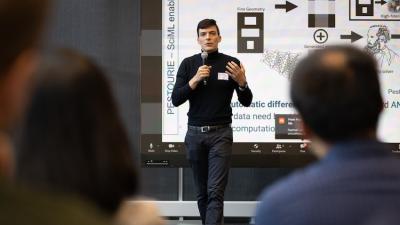Jan 31, 2024
Scientists are always looking for better computer models that simulate the complex systems that define our world. To meet this need, a Georgia Tech workshop held Jan. 16 illustrated how new artificial intelligence (AI) research could usher the next generation of scientific computing.
The workshop focused AI technology toward optimization of complex systems. Presentations of climatological and electromagnetic simulations showed these techniques resulted in more efficient and accurate computer modeling. The workshop also progressed AI research itself since AI models typically are not well-suited for optimization tasks.
The School of Computational Science and Engineering (CSE) and Institute for Data Engineering and Science jointly sponsored the workshop.
School of CSE Assistant Professors Peng Chen and Raphaël Pestourie led the workshop’s organizing committee and moderated the workshop’s two panel discussions. The duo also pitched their own research, highlighting potential of scientific AI.
Chen shared his work on derivative-informed neural operators (DINOs). DINOs are a class of neural networks that use derivative information to approximate solutions of partial differential equations. The derivative enhancement results in neural operators that are more accurate and efficient.
During his talk, Chen showed how DINOs makes better predictions with reliable derivatives. These have potential to solve data assimilation problems in weather and flooding prediction. Other applications include allocating sensors for early tsunami warnings and designing new self-assembly materials.
All these models contain elements of uncertainty where data is unknown, noisy, or changes over time. Not only is DINOs a powerful tool to quantify uncertainty, but it also requires little training data to become functional.
“Recent advances in AI tools have become critical in enhancing societal resilience and quality, particularly through their scientific uses in environmental, climatic, material, and energy domains,” Chen said.
“These tools are instrumental in driving innovation and efficiency in these and many other vital sectors.”
[Related: Machine Learning Key to Proposed App that Could Help Flood-prone Communities]
One challenge in studying complex systems is that it requires many simulations to generate enough data to learn from and make better predictions. But with limited data on hand, it is costly to run enough simulations to produce new data.
At the workshop, Pestourie presented his physics-enhanced deep surrogates (PEDS) as a solution to this optimization problem.
PEDS employs scientific AI to make efficient use of available data while demanding less computational resources. PEDS demonstrated to be up to three times more accurate than models using neural networks while needing less training data by at least a factor of 100.
PEDS yielded these results in tests on diffusion, reaction-diffusion, and electromagnetic scattering models. PEDS performed well in these experiments geared toward physics-based applications because it combines a physics simulator with a neural network generator.
“Scientific AI makes it possible to systematically leverage models and data simultaneously,” Pestourie said. “The more adoption of scientific AI there will be by domain scientists, the more knowledge will be created for society.”
[Related: Technique Could Efficiently Solve Partial Differential Equations for Numerous Applications]
Study and development of AI applications at these scales require use of the most powerful computers available. The workshop invited speakers from national laboratories who showcased supercomputing capabilities available at their facilities. These included Oak Ridge National Laboratory, Sandia National Laboratories, and Pacific Northwest National Laboratory.
The workshop hosted Georgia Tech faculty who represented the Colleges of Computing, Design, Engineering, and Sciences. Among these were workshop co-organizers Yan Wang and Ebeneser Fanijo. Wang is a professor in the George W. Woodruff School of Mechanical Engineering and Fanjio is an assistant professor in the School of Building Construction.
The workshop welcomed academics outside of Georgia Tech to share research occurring at their institutions. These speakers hailed from Emory University, Clemson University, and the University of California, Berkeley.




